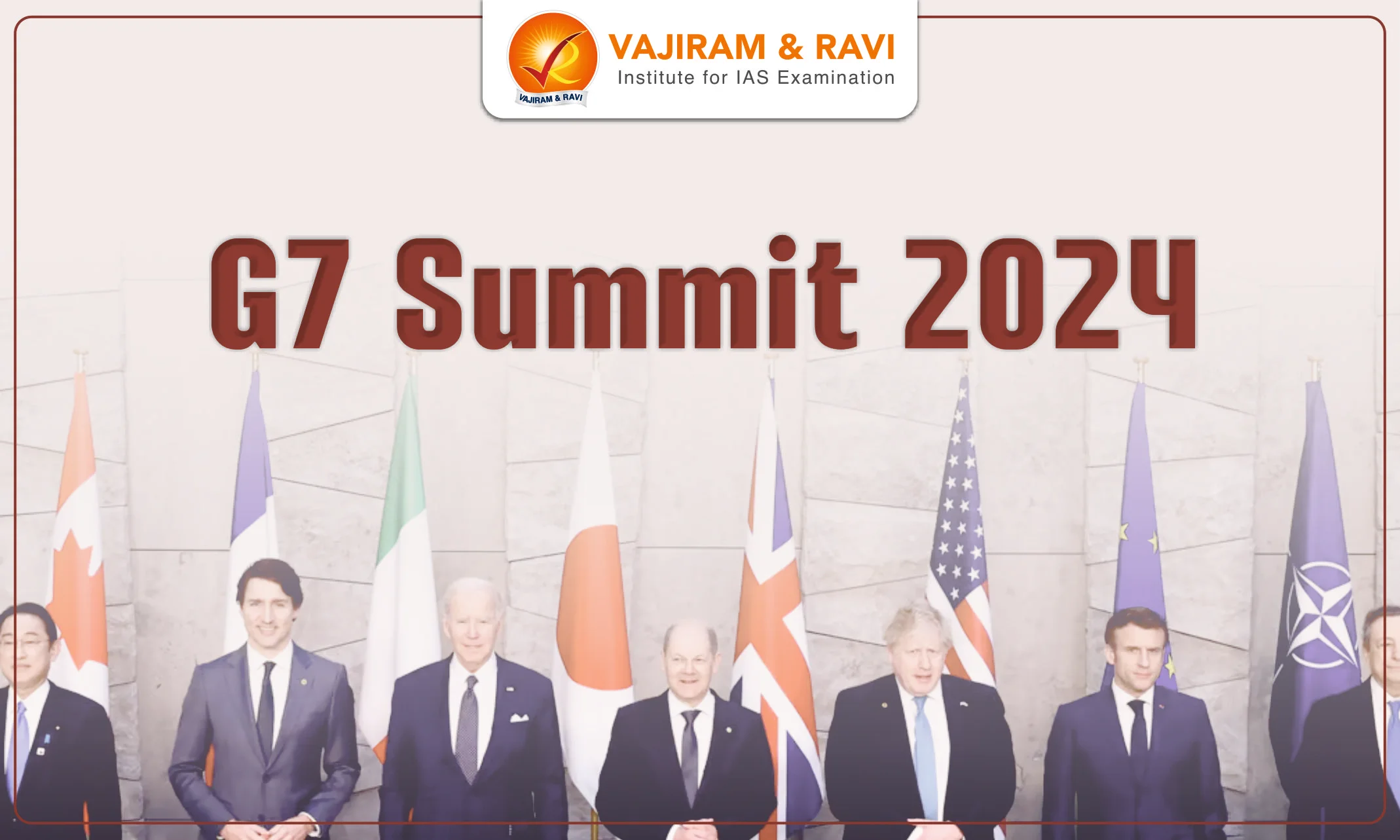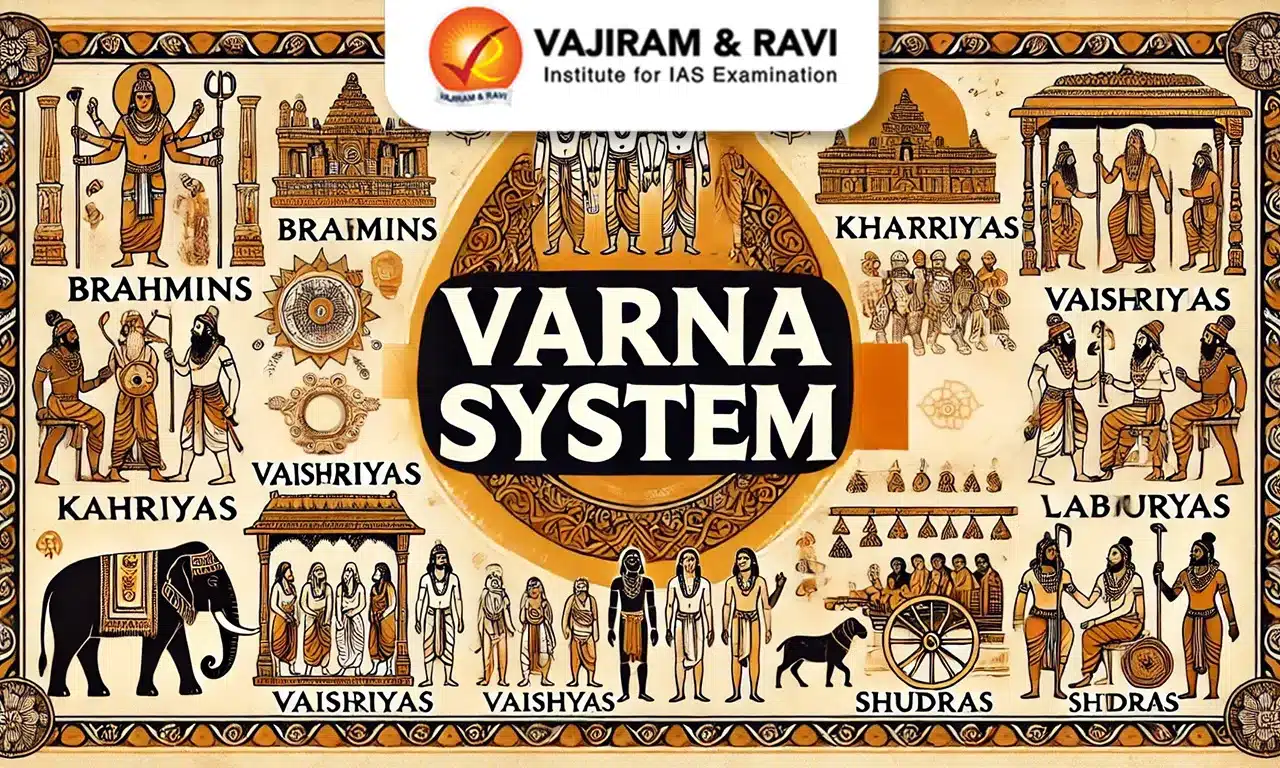The Group of Seven (G7) was formed as an informal forum for the world’s leading industrialised nations to discuss economic stability and coordinate their economic policies. Originating in 1975 amidst oil shocks and economic crises, the G7’s goals have evolved to address a broader range of global issues impacting international economic policy, security, technological advancement, climate change, etc.
In 2024, the G7 summit was hosted by Italy, focusing on the defence of the rules-based international system, engaging with Africa, solutions for the Russia-Ukraine and Israel-Gaza conflicts, and the relationship with developing nations and emerging economies.
Historical Context and Evolution of G7
The G7 originally began as the Group of Six (G6) in 1975, consisting of the United States, France, Italy, Japan, the United Kingdom, and West Germany.
- Purpose: The primary aim was to address significant economic issues like inflation and the global recession that followed the Organisation of the Petroleum Exporting Countries (OPEC)’s oil embargo in 1973-74.
- Expansion: Canada joined the group in 1976, leading to its transformation into the G7, and Russia joined in 1997, temporarily expanding it to the G8; however it was excluded in 2014 following its annexation of Crimea.
- Since 1981, the European Union has been involved in G7 meetings, represented by the Presidents of the European Council and the European Commission.
- The EU participates in the group’s work but does not hold the rotating presidency.
Functioning of the G7
- Membership criteria: No formal membership criteria exist, but the nations are typically wealthy democracies.
- Structure: The G7 lacks a formal institutional structure. It does not have a charter or a permanent secretariat.
- Presidency: The presidency of the G7 rotates annually among the member countries.
- The president of the country is responsible for setting the agenda of the summit and organising the meetings.
- Sherpas: These ministers or envoys prepare the groundwork for the summit through policy discussions and meetings.
- Sherpas are responsible for overseeing the negotiations and drafting the Group’s final communiqué.
- The process incorporates contributions from various tracks, including Political Directors, Foreign Affairs Sous-Sherpa (FASS) and the Finance-Deputies.
Key Achievements of G7 Summit
- Economic and political agenda: Over the decades, the G7’s agenda has expanded from primarily economic issues to include a wide range of global challenges like trade, security, climate change, and more recently, technological advancements like artificial intelligence.
- Global crisis response: Notably, the G7 has coordinated actions on global economic recoveries, health emergencies like the COVID-19 pandemic, and geopolitical conflicts including the Russian invasion of Ukraine.
- Innovations in Governance: The introduction of initiatives like the “Hiroshima AI Process” highlights the G7’s role in addressing emerging technological challenges.
Limitations and Challenges of G7
While the G7 has been a key platform for international cooperation on various issues, its relevance has been questioned in recent years due to its inability to handle modern-day crises.
- Limited representation: It faces criticism for its limited representation, pro-capitalist and elitist approach, and overt Western bias.
- The G7’s member states represent less than 30% of the global GDP currently, a decrease from nearly 50% in the 1970s when it was formed.
- The Western-centric approach is challenged by emerging powers like BRICSseeking greater representation and influence in global governance.
- There is a growing discourse for the G7+, including emerging economies like India, China, Brazil, etc.
- Economic uncertainty: The G7 economies have been facing challenges such as slow economic growth, rising inequality, and ageing populations.
- For Example: Italy has struggled with high levels of public debt and slow economic growth for many years, while Japan is facing demographic challenges due to its ageing population.
- Climate change: There are significant differences in approaches and priorities among the member countries, making it challenging to agree on meaningful action on climate change.
- Global health: The COVID-19 pandemic has highlighted the need for international cooperation in addressing global health issues.
- However, the G7 has faced criticism for its slow response and uneven distribution of vaccines, raising questions about its ability to address future pandemics.
- Geopolitical tensions: The G7 member countries have different geopolitical priorities and divergent interests in certain regions of the world.
- Example: The USA has been focused on containing China’s rise as a global power, while European countries have been more focused on addressing issues in their region, such as the ongoing conflict in Ukraine.
- Rise of China: China’s rise as a major economic and political power has altered the global balance.
- China’s Belt and Road Initiative (BRI) leading to a “debt trap” raises concerns amongst the G-7 nations.
- This is why a sustainable infrastructure investment plan through the Partnership for Global Infrastructure and Investment (PGI) was launched at the G-7 2022 summit.
- Internal disagreements: The unity of the G7 is occasionally challenged by differing national interests, particularly under varying U.S. administrations, which have swayed the group’s approach to global trade, climate policies, and diplomatic relations.
- De-globalisation: Additionally, the trend towards de-globalisation, characterised by a shift away from international economic integration and towards more nationalist policies, poses a challenge to the G7’s principles of promoting free trade and collective action on global issues.
Key Agenda at G7 Summit 2024
The key agenda of the G-7 summit at Puglia, a city that has “acted as a bridge between East and West”, is to align with the Summit’s focus on the Global South as well as focusing on the rules of international law, economic and security, migration problems and cooperation with Africa.
- Ukraine conflict: G7 countries are enhancing their support for Ukraine by utilising €300 billion in frozen Russian assets, including a $50 billion loan proposal, to address the ongoing conflict’s financial and humanitarian impacts.
- Israel-Gaza conflict: The G7 summit addresses the escalating Israel-Gaza conflict with a proposal led by the US President,
- It would include an immediate ceasefire, increased humanitarian aid, and a comprehensive peace agreement to ensure security for both Israelis and Gazans.
- Economic security: The G7 is committed to securing economic and strategic interests in the Indo-Pacific region by addressing trade security, building alliances, and countering China’s growing influence.
- Artificial Intelligence: Discussions include the ethical use of AI and energy transitions.
- The summit aims to set standards for AI governance while promoting energy initiatives that support sustainable development in the Africa-Mediterranean corridor.
- Migration: The summit prioritises effective migration management strategies, focusing on coordinated policies, humanitarian assistance, and secure borders to handle the complexities of global migration flows.
- Fostering partnerships with African countries: G7 countries commit to intensifying support for African development, aligning with the African Union Agenda 2063, focusing on food security, infrastructure, trade, and agricultural productivity.
- The Italian Prime Minister prioritises Africa in her foreign policy through the Mattei plan, focusing on clean-energy investments to support sustainable development, democratic governance, and regional stability.
- Climate change: The G7 needs help to meet its 2030 emission reduction targets, with a projected 19-33% reduction compared to the 40-42% goal.
- The summit will focus on reinforcing commitments and innovative solutions, including phasing out coal power by the mid-2030s to accelerate the transition to cleaner energy.
- Dialogue with emerging economies and developing nations: The G7 intends to engage with key emerging economies to address global challenges through dialogue on economic development, sustainable growth, climate change, and security.
- The heads of state of twelve non-member countries, including India, have been invited to the 2024 summit.
Significance of G7 for India
India has been a guest country participant in G7 meetings, reflecting its rising global stature and the recognition of its role as a major economic and geopolitical actor.
- Economic significance: India’s participation in the G7 allows it to access cutting-edge technologies and expand into new markets.
- Being the 5th largest economy with a rapid and continuous growth rate, India is a significant economic player, especially in contrast with Western countries’ stagnant growth prospects.
- India can benefit from the G7’s technological advancements, particularly in the areas of renewable energy, artificial intelligence, and digital technology.
- Strategic partnerships: India has emerged as a significant strategic partner for Western countries within the G7 framework, particularly in countering China’s influence in the Indo-Pacific.
- India has strategic partnerships with several G7 members, including the U.S., U.K., France, Germany, and Japan, and is expanding ties with Italy to promote its interests in stable markets, sustainable development, and equitable governance.
- Development assistance: The G7 countries are major donors of development assistance, and their policies and funding decisions can impact India’s development agenda.
- Example: The G7’s support for global education initiatives has benefited India.
- Balancing global relationships: India strategically manages its historical ties with Russia alongside its growing relationships with Western nations.
- This balancing act is critical in maintaining stability and pursuing strategic interests amidst global geopolitical shifts.
- Navigating the Indo-Pacific dynamics: G7 meetings allow India to better engage with major powers in the Indo-Pacific region, helping it influence regional dynamics and maintain a balance among the US, China, and other regional stakeholders.
- Climate change: The G7 countries have significant influence over global climate policy, and closer cooperation with them could help India to reduce its emissions and adapt to the impacts of climate change.
- Example: India attended the G7 summit in 2019 as a “Goodwill Partner”, and the Prime Minister participated in the Sessions on ‘Climate, Biodiversity and Oceans’ and ‘Digital Transformation’.
- Post-G20 Summit, India aims to lead the global south, especially in climate change discussions.
Last updated on July, 2025
→ UPSC Notification 2025 was released on 22nd January 2025.
→ UPSC Prelims Result 2025 is out now for the CSE held on 25 May 2025.
→ UPSC Prelims Question Paper 2025 and Unofficial Prelims Answer Key 2025 are available now.
→ UPSC Calendar 2026 is released on 15th May, 2025.
→ The UPSC Vacancy 2025 were released 1129, out of which 979 were for UPSC CSE and remaining 150 are for UPSC IFoS.
→ UPSC Mains 2025 will be conducted on 22nd August 2025.
→ UPSC Prelims 2026 will be conducted on 24th May, 2026 & UPSC Mains 2026 will be conducted on 21st August 2026.
→ The UPSC Selection Process is of 3 stages-Prelims, Mains and Interview.
→ UPSC Result 2024 is released with latest UPSC Marksheet 2024. Check Now!
→ UPSC Toppers List 2024 is released now. Shakti Dubey is UPSC AIR 1 2024 Topper.
→ Also check Best IAS Coaching in Delhi
G7 Summit FAQs
Q1. What is the G7?+
Q2. What are the key decisions made by the G7 Summit?+
Q3. What are the key benefits of the G7 forum?+
Q4. Is the G7 in competition with the UN?+
Tags: g7 summit 2024 quest















